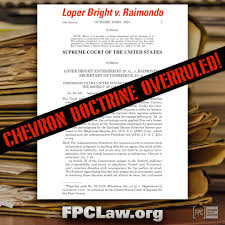Please, everyone, take a deep breath. Although the Supreme Court’s decision in Loper Bright Enterprises v. Raimondo has now overruled the Chevron decision on deference to agencies, there is much less to Loper Bright than meets the eye. Overheated praise and overheated condemnation of the decision both miss the mark. It is entirely possible that much or most of what was (somewhat misleadingly) called “Chevron deference” can be and will be recreated under a different label: “Loper Bright delegation.” Indeed, the Court has already recreated it under that label, in the Loper Bright opinion itself.
Let me begin with Henry Monaghan, a brilliant scholar of public law from Columbia University, and an article he wrote in 1983 titled “Marbury and the Administrative State.” Monaghan’s central point was that there was no logical inconsistency between saying two different things: (1) the constitutional power and duty of judges to say what the law is, and the Administrative Procedure Act’s instruction to courts to decide all relevant questions of law,1 require judges to decide all legal questions independently; (2) agencies rather than courts may have the authority to fill in the details of statutory gaps or ambiguities. The reason those two things are consistent is simple. When judges identify the “best reading” of the statute, that best reading might itself just be that an explicit or implicit congressional delegation of such authority to the agency has occurred. Justice Kagan has underscored this point a number of times.
What are the logical consequences of Monaghan’s view? In a paper for an excellent recent symposium on Chevron deference in the George Mason Law Review, I explained that, on Monaghan’s logic, Chevron could be “overruled” in name, but then immediately reinstated under a different label — the label of delegation. That reinstatement could even occur in the very same decision that “overruled” Chevron. If I may be forgiven a self-quotation:
“[On this possibility,] deference will be reframed but not eliminated. The overruling majority will say—along lines indicated by Professor Henry Monaghan decades ago—that de novo or plenary judicial review of agency legal interpretations is required by legal sources (either by the Administrative Procedure Act (“APA”), by Article III, or both). Yet the Court will also say that de novo interpretation might of course itself yield the conclusion that, in a given statute, Congress has delegated primary responsibility to agencies to fill in statutory gaps or ambiguities, subject to judicial review to ensure that agencies have remained within the scope of the delegation and chosen policy on reasonable grounds. This second possibility—call it retail Chevron rather than wholesale Chevron—will offer the Justices skeptical of Chevron an attractive resolution of the[ir] dilemma; it will allow the majority not only to overrule Chevron but, even more importantly, to be seen to overrule Chevron, while also largely preserving Chevron’s major source of appeal to judges—a way to avoid having to actually do fully independent interpretation of statutory terms that are vague, technical, or both.”
That is what has now occurred, almost exactly. ***
